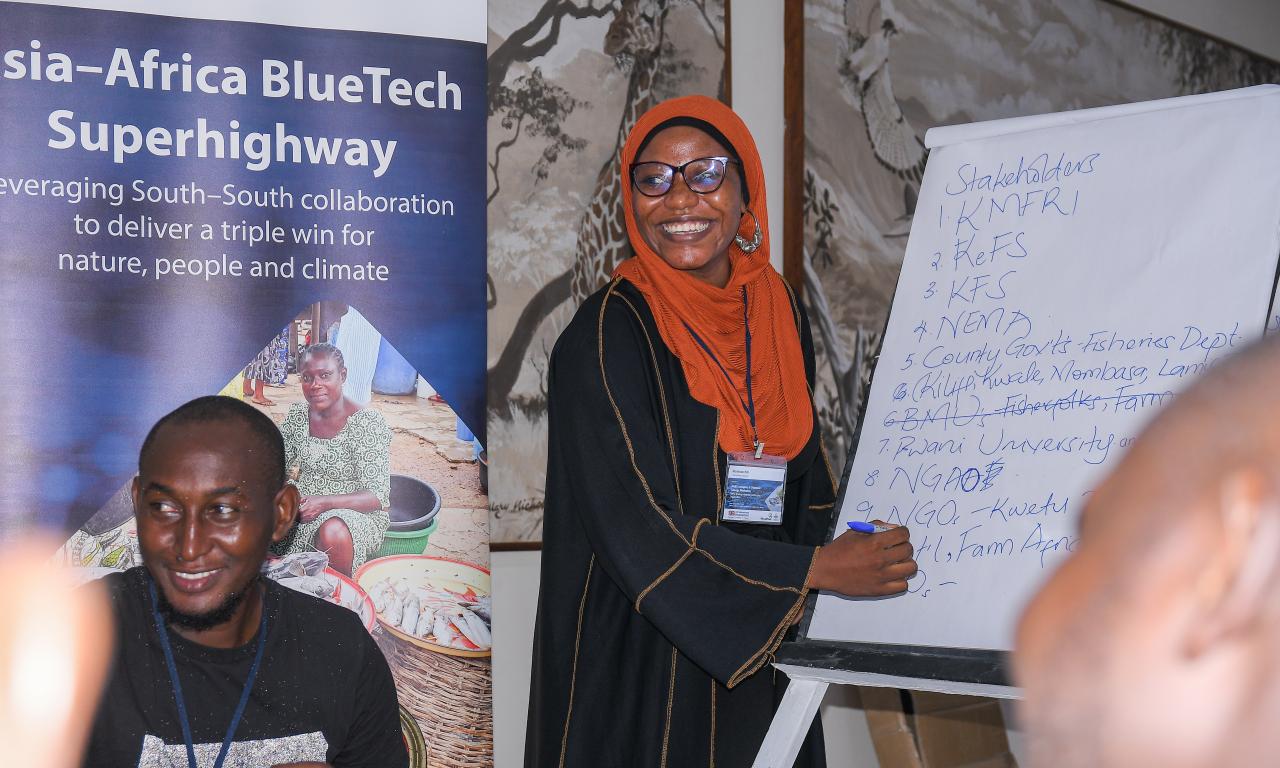
- Kenya's extensive coastline and freshwater resources hold vast potential for diverse aquaculture practices, yet remain largely untapped. The AABS project, with backing from the UK government, aims to strengthen this sector through South-South collaboration.
- At a pivotal workshop in Mombasa, stakeholders across the aquaculture spectrum—from farmers to researchers—collaborated on the AABS project to design actionable steps for adopting Integrated Multitrophic Aquaculture (IMTA) practices. This collaborative approach ensures that the project's outcomes are well-aligned with the needs and realities of local communities.
- IMTA presents a unique opportunity to enhance profitability and environmental sustainability in Kenyan aquaculture.
Kenya’s vast coastline and its network of freshwater resources provide suitable ground for different types of aquacultures. However, only 0.014 percent of the area with aquaculture potential was utilized by 2017, according to the Kenya Marine and Fisheries Research Institute (KMFRI).
Now, Kenya is on a journey that may change its aquaculture fortunes. WorldFish’s Asia-Africa BlueTech Superhighway project (AABS), a project funded by the UK government and that KMFRI is partnering on, held a workshop in the coastal city of Mombasa, Kenya, in March 2024, bringing together the country’s stakeholders in aquaculture. The stakeholders, who cut across the aquaculture spectrum from farmers and traders to NGOs and research institutions, discussed the potential of IMTA in Kenya and developed a theory of change connecting the design of AABS activities and actors to tangible outcomes in the participating communities.
“In IMTA systems, you have species that are eating at different levels such that the waste from one species is food for another and very little is wasted”, said Dr Rodrigue Yossa, Director of Aquatic Food Biosciences at WorldFish.
The IMTA innovations could be transformative for Kenya’s small-scale actors in seafood production.
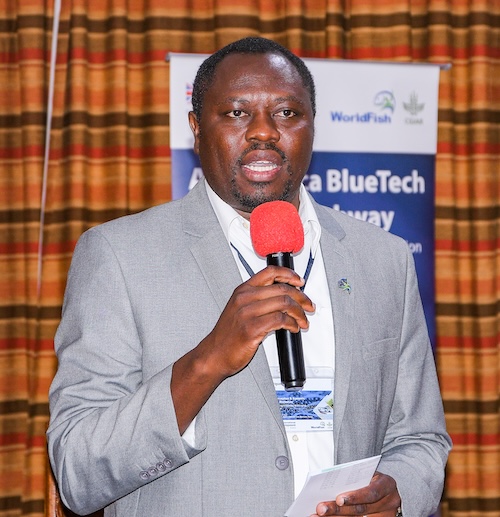
IMTA: Opportunities and Challenges
During the opening of the workshop, Dr. David Mirera, the Assistant Director of Mariculture at KMFRI underscored the importance of the introduction of IMTA technology in the country’s blue economy. He said 41 groups of farmers engage in finfish and shellfish aquaculture in the country. Additionally, he pointed out access to seed, transport and storage as the main challenges that aquaculture faces in the country.
Dr. Esther Wairimu, a senior scientist at KMFRI, took the stakeholders through the IMTA technology, sharing its scope, applicability and potential species for culture and an overview of aquaculture sites.
“IMTA is a production model based on the sustainability principle. It allows for greater efficiency, competitiveness and profitability,” said Wairimu.
George Kunga, the chairperson of Empower CBO, a community-based organization which undertakes mariculture of shrimps in Mombasa, lauded the new technology saying that it is going to solve the challenge brought about by the culture of a single species. “The water is polluted by unconsumed feeds and excrete stays in the water for the duration of the culture,” he said. With IMTA, Kunga said that Empower can reduce organic waste in the pond and eliminate all mineral scavengers like seaweed in the pond by use of bottom feeders. “We look forward to improving the yield and income as an organization,” he said.
For Tima Mwalimu, a seaweed farmer from Kwale in the South Coast and her fellow farmers, the introduction of finfish into their seaweed farms could be the turnaround point to boost their group’s revenue, which have dwindled since they lost a major seaweed buyer during Covid period.
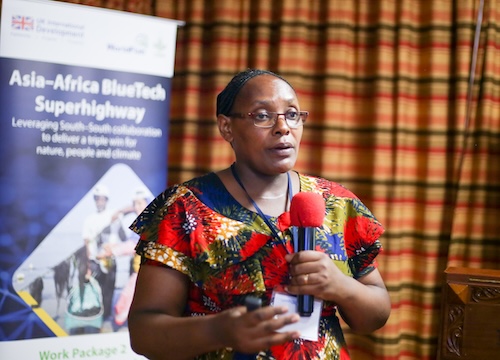
IMTA is a new technology in Kenya and in other countries where AABS will be implemented. Yossa shared that different countries have undertaken different types of aquacultures. “For example, in Kenya, people are doing seaweed, some are doing sea cucumber, and cage farming has also started. These are all components that can be included in integrated multitrophic aquaculture. In Nigeria, it is just starting but we see the potential because they have a long coast. In terms of aquaculture, they are quite well set especially when it comes to catfish farming. IMTA will help them understand what it takes to have a sustainable aquaculture production,” he said.
Theory of Change: A Tool for Participatory Project Design
The stakeholders attending the workshop broke out in discussion groups to identify and map the IMTA challenges through their perspectives and the various actors in the small-scale coastal aquaculture space, in addition to proffering likely solutions.
“This is the first time that I have seen a project engage people from the grassroots level in voicing what their real problems are. In other projects, most of the time you are invited to the inception to be told how the project is going to run, these are the activities you are going to do and so we need your help here and there,” said Numious Kiti, a founding member of Pamoja Pwani Network, commending AABS’s engagement of stakeholders in the development of a theory of change.
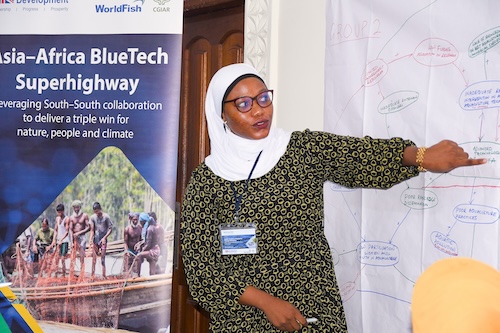
On his part, Dr. Jonathan Munguti, the Director of Aquaculture Research at KMFRI, said AABS approach is well thought out as it has looked at the entire value chain, from the start to the end, the issues and the gaps.
“The engagement of the stakeholders to bring in ideas of what they think needs to be done, what the challenges are, and who the key players are at the start of the project prepares it for success,” said Munguti.
At the core of AABS is the South-South collaboration and knowledge transfer which will benefit aquaculture farmers in the participating countries. Lessons learnt from Asia and Africa will be shared with stakeholders across the countries in a feedback look for further adaptation and value-added outcomes from IMTA.
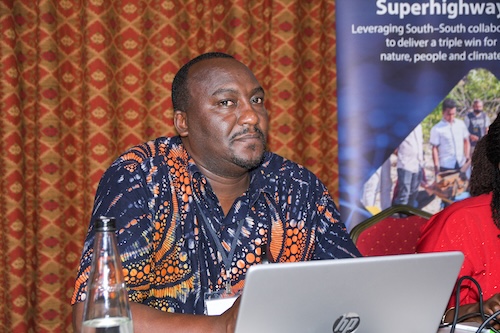
Next Steps
Following the success of AABS’s inception workshop for the Integrated Multitrophic Aquaculture in Mombasa, implementation with the local partners will follow.
“The next step is to implement the project in Kenya with stakeholders to achieve the targeted outcomes, following the impact pathway developed during the Theory of Change workshop,” said Dr. Yossa.
IMTA is one of the four work packages that AABS is implementing over 7 years of the project to improve the livelihoods of vulnerable coastal communities and to restore marine and coastal ecosystems in countries across Africa and Asia.
